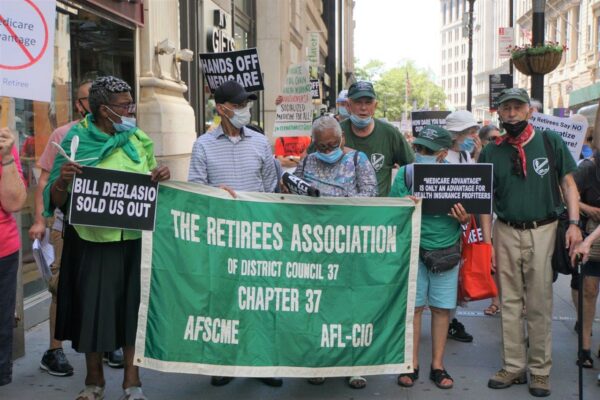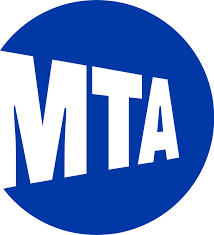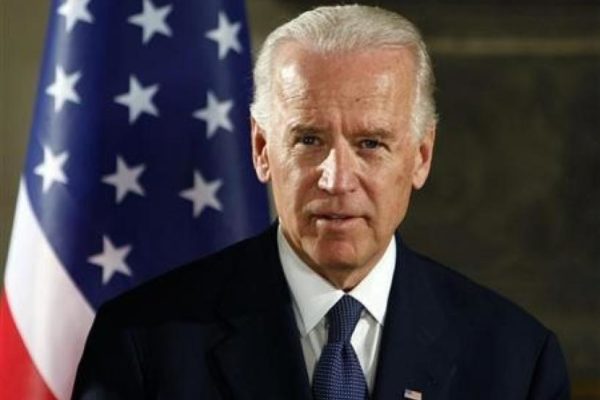NEW YORK, N.Y.—With the Municipal Labor Committee scheduled to vote July 14, on a proposal to switch retired city workers’ health care from traditional Medicare to a private Medicare Advantage plan, the union representing City University faculty and staff is calling on them to delay it until retirees can get more information.

“Our members are deeply troubled by the MLC’s rush to vote on this proposal,” Professional Staff Congress President James Davis said in a statement July 12. “We are concerned by the closed nature of the negotiations. Municipal retirees should have a chance to review the agreement and engage with their representatives to the MLC before a vote. MLC unions have not been provided with a copy of the contract with the proposed vendor.”
The proposal would replace the current system, in which health care for the about 245,000 retirees is covered by Medicare, which pays only 80% of costs, with a private supplemental plan, EmblemHealth’s GHI Senior Care, covering the rest. Instead, all care would be under the umbrella of a Medicare Advantage plan, paid for and regulated by Medicare but run by private companies. The city and the MLC, the coalition of municipal workers’ unions that negotiates contracts, have been evaluating bids from insurance companies.
The MLC says the change is necessary because annual health-care costs for city workers have more than doubled in the past 10 years, from $5 billion to $11 billion, despite saving more than $450 million a year by things like having colonoscopies done in outpatient facilities instead of hospitals, and putting new hires into a private health-maintenance organization for their first year on the job. The Senior Care plan’s costs have risen by almost 30% over the past six years, it adds.
Meanwhile, it says, the Health Care Stabilization Fund, which the MLC runs jointly with the city to help provide prescription-drug, vision, and dental coverage, “will be completely depleted within the next year unless steps are taken now.”
The proposed Medicare Advantage plan would keep retirees’ coverage and benefits largely intact, the MLC contends.
Many retirees are highly skeptical, fearing that leaving traditional Medicare will increase costs for individuals, and that many doctors and facilities would not be included in the private plans’ networks of coverage.
There are three problems with Medicare Advantage, Stu Eber, president of the Council of Municipal Retirees Organizations, told LaborPress at a protest in late June. First, “no Medicare Advantage plan that currently exists guarantees that your doctor will accept the plan.” Second, “no hospital is obligated to accept any Medicare Advantage group plan.” And third, “all Medicare Advantage group plans have gatekeepers,” which “sticks a clerk between you and your doctor.”
“Retirees need to know how this change will impact their health coverage,” Davis said. “They should understand which doctors and hospitals they will be able to visit and what costs they are likely to incur. The details of the proposed agreement, the role of federal subsidies in incentivizing privatization, and the rationale for rejecting alternatives to a shift to Medicare Advantage should all be reviewed.”
The MLC argues that the change will save the city more than $500 million a year, because Medicare Advantage plans are eligible for federal subsidies not available for Senior Care. It adds that the plan offered will be a Group Medicare PPO [preferred provider organization], “which does not restrict access to providers or services like an Individual Medicare HMO might.”
More than 90% of current utilization will be covered “on an in-network basis,” it says, and for those not covered, the MLC-government alliance “will work with members and providers to arrange payment,” and “members will be held harmless.” The alliance says it is also working to bring Memorial Sloan Kettering Cancer Center, which does not currently accept Medicare Advantage plans, into the network by Jan. 1.
The proposal’s cost increases, such as $15 copays for doctor visits, tests, and eye and hearing exams, are already scheduled to go into effect for Senior Care on Jan. 1, the MLC says. It would establish a $1,470 out-of-pocket maximum for medical costs, but would eliminate the $2,500 maximum for “durable medical equipment” such as wheelchairs and blood-sugar test strips.
Davis argues that the MLC and the city Office of Labor Relations could find other ways to reduce costs “without placing the quality and affordability of retiree health care at risk,” such as by “stringent accountability” over “skyrocketing hospital costs and prescription drug charges.”
Another objection to Medicare Advantage is that while the proposal is supposed to keep retirees’ benefits largely intact, that is only guaranteed for five years. “This austerity measure opens the door to further cost-cutting and diminished benefits in future contracts,” Davis said. “Whatever its provisions, a plan to shift the cost-saving burden to union members and municipal employees does not bode well for the future. Higher costs may be demanded of union members down the line.”
Ultimately, he said, “the answer is not privatization. It is to continue labor’s fight for a single-payer public health-care system and a system for New York that serves municipal workers fairly.”




1 thought on “PSC Urges NYC Unions to Delay Further Privatization of Retiree Healthcare”
I have been keeping up with events as my husband and I are both affected by this horror. We only learned about it through a friend about 3 weeks ago. I called a retired school teacher living in Queens whom I’ve known for 50 years. She was never informed.